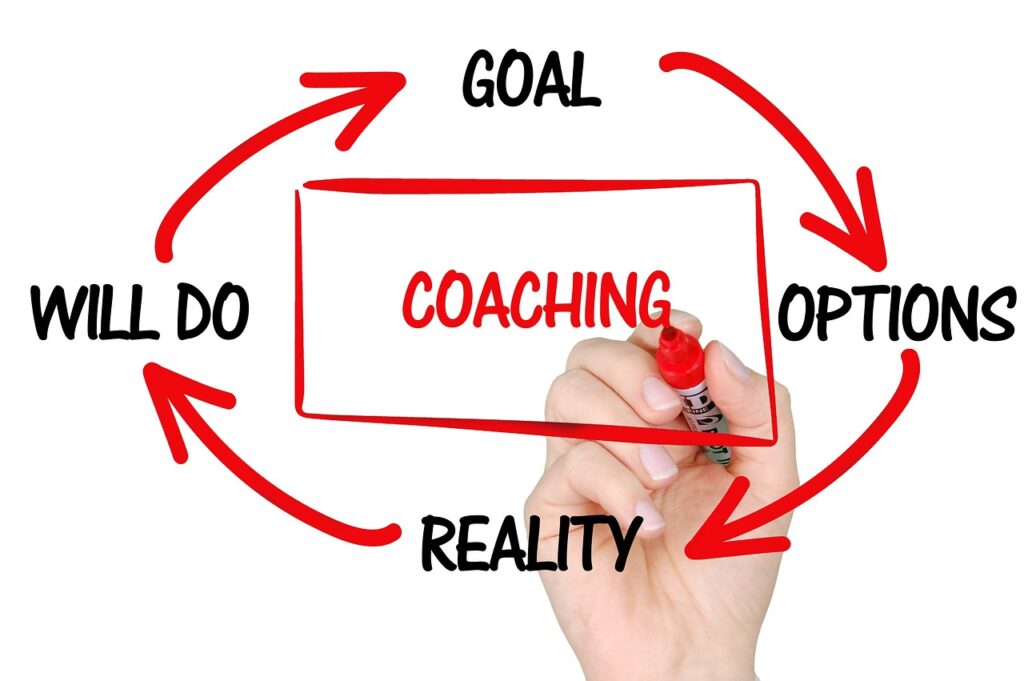Momentum coaching is a powerful tool that empowers individuals to achieve personal and professional growth across all areas of their lives.
In today’s fast-paced world, achieving consistent personal and professional growth can often seem like an uphill battle. This is where momentum coaching comes into play. This method offers a dynamic approach to inspire and facilitate your journey toward success.
By focusing on strategies centered around building emotional intelligence and leadership skills, momentum coaching empowers you to overcome barriers and maintain forward momentum in all aspects of your life. It’s not just about reaching your goals; it’s about exceeding them with confidence and clarity.
As we delve into the nuances of momentum coaching, we’ll explore its foundational components, the coaching process itself, and the tangible benefits it can bring into your life. Momentum coaching provides the tools necessary for continued success by helping you create a resilient mindset and equipping you with emotional intelligence.
Whether you’re seeking to grow your leadership skills or find new ways to motivate and engage those around you, momentum coaching is designed to guide you every step of the way. This ensures that you’re not just moving, but advancing with purpose and passion.
Table of Contents
ToggleWhat is Momentum Coaching?
Momentum coaching is a dynamic and personalized approach designed to help you maintain continuous growth in both your personal and professional life. It centers around the concept of building consistent, actionable habits that align closely with your core values and long-term goals.
Key Elements of Momentum Coaching:
- Mental Health: Addressing mental health is a foundational component of momentum coaching. Coaches work with clients to ensure that their mental well-being is prioritized. This creates a solid base for achieving personal and professional goals.
- Personal and Professional Lives: Momentum coaching recognizes that personal life and professional life are interconnected. Effective coaching addresses both areas, fostering a balance that enhances overall life satisfaction.
- Executive Coaching: For professionals, momentum coaching includes executive coaching, which focuses on leadership development, strategic thinking, and achieving high-level career goals.
- Transformational Change: The primary goal of momentum coaching is to facilitate transformational change. This involves helping clients identify and overcome obstacles, develop new skills, and achieve a state of continuous improvement.
- Early Career Professionals and Young Adults: Momentum coaching is especially beneficial for early career professionals and young adults. These adults are navigating their emerging professional lives and personal development and benefit from the tools and strategies used in momentum coaching.
- Particular State: Momentum coaching helps individuals in a particular state of transition or uncertainty to find clarity and direction, ensuring that they are on a path to success and fulfillment.
- Professional Certified Coach: Working with a professional certified coach ensures that clients receive high-quality guidance grounded in proven methodologies and ethical practices.
- Common Goals: Momentum coaching often focuses on helping clients identify and achieve common goals that are aligned with their values and aspirations.
Definition and Concept
At its core, momentum coaching involves regular, focused interactions that aim to keep your life’s momentum going. These sessions provide a confidential space to tackle challenges, explore new perspectives, and celebrate your unique journey. Through personalized one-on-one conversations, you reconnect with your “why,” set clear visions for the future, and strategize on overcoming obstacles.
Importance of Feedback
The importance of feedback from the coaching client in momentum coaching cannot be overstated.
Asking clients for feedback provides valuable insights into the effectiveness of the coaching experience. It helps offer a better understanding of how coaching impacts people’s lives. This helps coaches refine their methods and tailor their services to meet the unique needs of their clients.
In the United States, online service providers are increasingly common. So this feedback feels crucial for maintaining a high standard of coaching.
Feedback Process
Engaging stakeholders in the feedback process serves multiple information purposes. It helps coaches understand how their services affect clients’ personal finances, life transitions, and overall well-being.
This feedback can come from a variety of ways, including surveys, interviews, and direct client interactions. A coach acting as a thought partner can utilize this information to help clients achieve a healthy balance between their personal and professional lives. Additionally, understanding the broader impact of coaching can inform business models, ensuring that the coaching practice remains sustainable and client-focused.
Incorporating stakeholder feedback into the coaching process leads to a more robust and adaptable service. For clients undergoing significant life transitions, such as career changes or financial planning, feedback from stakeholders can provide coaches with the necessary perspective to guide clients toward a solid financial life.
By continuously seeking and applying feedback, coaches can ensure their practices remain relevant and effective, ultimately supporting clients in achieving lasting success and fulfillment in their personal and professional lives.
The feedback loop is essential for maintaining momentum, allowing you to adapt and evolve in response to both successes and setbacks.
The Coaching Process
Customization Based on Needs
Momentum coaching begins with gathering feedback to create a behavioral development plan tailored to your needs. This plan focuses on developing your leadership skills, necessary to inspire and engage others effectively. Each session builds on emotional, collaborative, and systems intelligence, leading to shifts in thinking and more effective actions.
Session Structure and Goals
Initially, goals are set to clarify your desired outcomes, which are revisited and refined throughout your coaching journey. This structured approach not only provides a focused framework to follow, but also adapts to your evolving needs, ensuring continuous growth and achievement of specific, actionable results.
Benefits of Momentum Coaching
Improved Emotional Intelligence
Momentum coaching significantly boosts your emotional intelligence (EI), enabling you to understand and manage your emotions effectively. This improvement helps you navigate stress, embrace change, and recover from setbacks with agility. As you become more empathetic, your relationships, both personal and professional, deepen, fostering an environment of trust and effective communication.
Enhanced Collaborative Skills
Through momentum coaching, you develop collaborative skills that enhance teamwork and conflict resolution. The coaching encourages you to experiment and create opportunities for growth within your team, leading to increased resilience and adaptability. This approach not only strengthens team dynamics but also boosts overall productivity and satisfaction.
Systems Thinking Improvement
Adopting systems thinking through momentum coaching allows you to see the bigger picture. It also helps you understand the interconnectedness of actions within your personal and professional life. This holistic view aids in identifying leverage points where small changes can lead to significant impacts, enhancing your strategic planning and problem-solving capabilities.
Conclusion
In conclusion, momentum coaching is a transformative approach that supports personal growth and development across the entire life spectrum. Are you a business owner, an individual in a new job, or stepping into a new role? If so, momentum coaching offers the tools and strategies necessary for success. It integrates elements of positive psychology to address complex issues, ensuring a holistic and effective coaching experience.
Momentum coaching is also adaptable to the modern world. This is especially true for online service providers offering digital products and services to private clients. This future flexibility allows for a good fit between the coach and client, regardless of geographical boundaries.
Additionally, momentum education equips clients with the knowledge and skills needed to thrive. It helps in various aspects of their lives, including legal counsel and other professional needs.
For those seeking to enhance their personal and professional lives, momentum coaching provides comprehensive support. By addressing individual needs and goals, it empowers clients to achieve lasting positive change and success.
This proactive approach ensures that you remain flexible and responsive in your personal and professional development. Keep asking yourself what you are doing today to maintain or build your momentum. By staying committed and consistent, you ensure that your growth trajectory remains strong and unstoppable.
FAQs
What is momentum coaching?
Momentum Coaching is a specialized program. It’s designed to accelerate the professional development of leaders who are ready to take the next step in their careers. These short-term, focused coaching sessions aim to enhance growth, boost performance, and concentrate on specific developmental areas.
What techniques are used in GROW coaching?
The GROW Coaching Model utilizes a structured approach comprising four key steps:
- Goal: Establish the objective or desired outcome for the coaching session.
- Reality: Assess the current situation related to the goal, including any challenges or barriers.
- Options: Generate ideas and explore potential strategies to advance toward the goal.
- Way Forward/Will: Commit to specific actions and timelines for the chosen options to reach the goal.
How is the GROW coaching format structured?
The GROW format is a coaching framework organized into four stages:
- Goal: Define what you want to achieve.
- Reality: Understand where you currently are in relation to your goal.
- Obstacles/Options: Identify challenges and possible solutions.
- Way Forward/Will: Develop a concrete action plan to achieve the set goal.
This method encourages effective goal-setting and strategic planning, aiding managers in guiding their teams more effectively.






